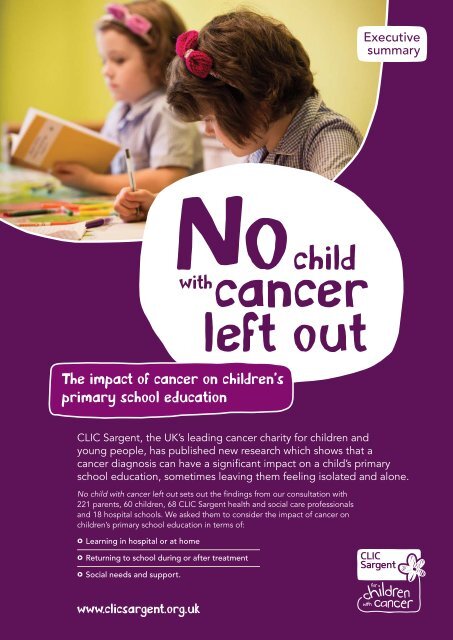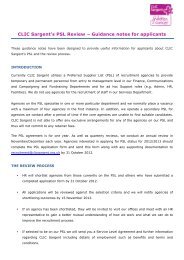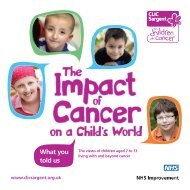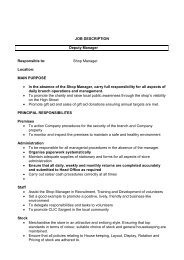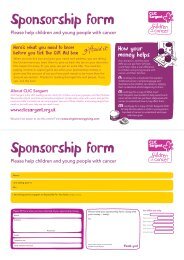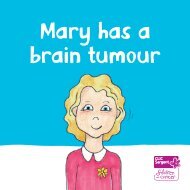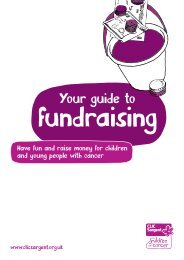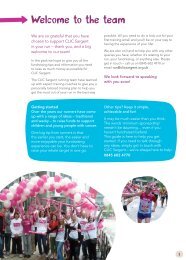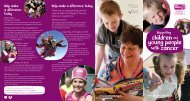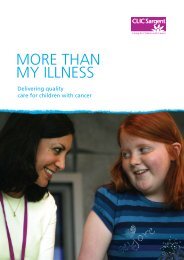No child with cancer left out executive summary - CLIC Sargent
No child with cancer left out executive summary - CLIC Sargent
No child with cancer left out executive summary - CLIC Sargent
- No tags were found...
Create successful ePaper yourself
Turn your PDF publications into a flip-book with our unique Google optimized e-Paper software.
Executive<strong>summary</strong><strong>No</strong><strong>with</strong> <strong>cancer</strong><strong>left</strong> <strong>out</strong>The impact of <strong>cancer</strong> on <strong>child</strong>ren’sprimary school education<strong>child</strong><strong>CLIC</strong> <strong>Sargent</strong>, the UK’s leading <strong>cancer</strong> charity for <strong>child</strong>ren andyoung people, has published new research which shows that a<strong>cancer</strong> diagnosis can have a significant impact on a <strong>child</strong>’s primaryschool education, sometimes leaving them feeling isolated and alone.<strong>No</strong> <strong>child</strong> <strong>with</strong> <strong>cancer</strong> <strong>left</strong> <strong>out</strong> sets <strong>out</strong> the findings from our consultation <strong>with</strong>221 parents, 60 <strong>child</strong>ren, 68 <strong>CLIC</strong> <strong>Sargent</strong> health and social care professionalsand 18 hospital schools. We asked them to consider the impact of <strong>cancer</strong> on<strong>child</strong>ren’s primary school education in terms of:ccLearning in hospital or at homeccReturning to school during or after treatmentccSocial needs and support.www.clicsargent.org.ukwww.clicsargent.org.uk
Key findingsLearning in hospital or at homeccOver two in three (70%) parentsreported that their <strong>child</strong> had receivedsome form of education away from theirprimary school during their treatment,mostly through hospital schoolsccAll of the hospital schools we spoke totold us that the level of communicationvaries considerably from one primaryschool to anotherccMore than one in three (36%) parentssaid their <strong>child</strong>’s primary school wasin regular contact <strong>with</strong> their <strong>child</strong>’shospital school during their time inhospital – but the majority of families didnot feel they were kept well-informedab<strong>out</strong> their <strong>child</strong>’s education whentheir <strong>child</strong> was taught in hospitalccSome <strong>child</strong>ren <strong>with</strong> <strong>cancer</strong> found itdifficult to access home tuition, andsome never managed to access it at all.Almost all the hospital schools we spoketo reported problems <strong>with</strong> home tuitionccJust over half (56%) of parents said theywere satisfied that their <strong>child</strong> wasgiven suitable school work whenthey were being taught at homeReturning to schoolccAlmost two in three (63%) parents toldus they felt well-informed ab<strong>out</strong> their<strong>child</strong>’s education at their primary schoolfollowing their <strong>cancer</strong> diagnosisccAlmost two in three (64%) parents saidthey were consulted ab<strong>out</strong> how their <strong>child</strong>’sdiagnosis should be communicated to otherteachers and school <strong>child</strong>ren – although onein three were not consulted on the matterccJust over half (56%) of parents of <strong>child</strong>renwho have returned to school felt thattheir <strong>child</strong> had received sufficient supportto enable them to resume as normal aneducation as possibleSocial impact and supportccMore than one in three (35%) parentssaid their <strong>child</strong> had experienced bullyingor teasing from their peers because oftheir <strong>cancer</strong> diagnosis and treatmentccAlmost half (47%) of parents said that their<strong>child</strong> had grown apart from friends becauseof their <strong>cancer</strong> diagnosis and treatmentc c Almost half (47%) of parents saidtheir <strong>child</strong>’s school did not help tomaintain contact <strong>with</strong> peers and friendsduring their absence from school.
The impact of <strong>cancer</strong> on<strong>child</strong>ren’s primary school educationOur research has demonstrated that <strong>cancer</strong> can significantly disrupt a <strong>child</strong>’seducation – nine in 10 (90%) <strong>child</strong>ren told us that their <strong>cancer</strong> diagnosis andtreatment made a difference to their school life.Our findings show that improvingcommunication between educationprofessionals, a pupil <strong>with</strong> <strong>cancer</strong> and theirfamily can considerably lessen the impact of<strong>cancer</strong> on a <strong>child</strong>’s primary school education.Good communication, for example, canenable a <strong>child</strong> <strong>with</strong> <strong>cancer</strong> to keep in touch<strong>with</strong> classmates when they are absent fromschool, allow for a smoother transitionwhen they return to school and helpparents feel empowered and informed.Raising awareness, and building knowledgeand understanding of the impact of <strong>cancer</strong> ona <strong>child</strong>, can help teachers and other pupils tobetter understand and support a classmate <strong>with</strong><strong>cancer</strong> during and after <strong>cancer</strong> treatment.It is essential that information ab<strong>out</strong>hospital education and hometutoring services are madefreely available to parentsand professionals inorder that they canmore easily accessthese services.“The overwhelming success was thehome tutor that our local councilprovided. They were just wonderful. Wereceived incredible support and everyfamily should have that as standard.”Parent of a <strong>child</strong> <strong>with</strong> <strong>cancer</strong><strong>CLIC</strong> <strong>Sargent</strong> wants to see a primary educationsystem that enables <strong>child</strong>ren diagnosed <strong>with</strong><strong>cancer</strong> to receive the support they needquickly, and for as long as they need it, sothat <strong>cancer</strong> does not unnecessarily impact ontheir education or their social and personaldevelopment. In order for this to become areality, systems for funding hospital schools andhome tuition must be fair and transparent toenable <strong>child</strong>ren <strong>with</strong> <strong>cancer</strong> to receive sufficienteducation that is flexibleenough to meettheir needs.
Ways forwardPolicy and influencing Proposed changes to SEN and disability provision across the UK, in particular the Children andFamilies Bill in England, must take into account the needs of <strong>child</strong>ren <strong>with</strong> <strong>cancer</strong>. <strong>CLIC</strong> <strong>Sargent</strong>will seek to raise awareness of their needs and influence policy makers to ensure that <strong>child</strong>ren<strong>with</strong> <strong>cancer</strong> receive the support they need in education to achieve their full potential Government funding reforms must ensure that hospital school and home tuition fundingarrangements allow <strong>child</strong>ren <strong>with</strong> <strong>cancer</strong> to access appropriate, quality provision. We willcontinue to work together <strong>with</strong> hospital schools to ensure that government funding reformsare informed by the needs of <strong>child</strong>ren <strong>with</strong> <strong>cancer</strong>Information Good information for <strong>child</strong>ren, parents and professionals on how they can support continuededucation during <strong>cancer</strong> treatment and beyond is vital. Parents must be empowered <strong>with</strong>information ab<strong>out</strong> how the education system works, their <strong>child</strong>’s rights and how to accessthe support that they need. <strong>CLIC</strong> <strong>Sargent</strong> will signpost families and professionals to existinginformation and work in partnership <strong>with</strong> others to develop resources where there are gaps Our research illustrates a number of good practice examples of how to support <strong>child</strong>ren learningin hospital, at home and when they return to primary school. We will share these ways of working<strong>with</strong> policy makers and education professionals to help them gain new insights and inspirationCommunication and engagement Primary schools, hospital schools and families play a vital role in helping <strong>child</strong>ren <strong>with</strong> <strong>cancer</strong>stay in touch <strong>with</strong> classmates when they are absent from school. <strong>CLIC</strong> <strong>Sargent</strong> will seek to raiseawareness of good practice, such as encouraging phone calls and letters and by maximisingthe use of technology Our research shows that by primary schools adopting an individualised and flexible approachto supporting the <strong>child</strong>, the experience of <strong>child</strong>ren returning to school during and after <strong>cancer</strong>treatment can be greatly improved. <strong>CLIC</strong> <strong>Sargent</strong> will share examples of good practice andprovide information to schools encouraging them to deliver the reasonable adjustments that a<strong>child</strong> <strong>with</strong> <strong>cancer</strong> might need on their return to school Our research highlights the importance and benefits of improving communication betweeneducation and other professionals involved in a <strong>child</strong>’s <strong>cancer</strong> journey, and <strong>CLIC</strong> <strong>Sargent</strong> willshare the findings and best practice to support a more integrated response. In particular, we willpromote the use of Teachers’ Days as a particularly effective tool in improving primary schoolteachers’ understanding of <strong>child</strong>hood <strong>cancer</strong>.To download a copy of <strong>No</strong> <strong>child</strong> <strong>with</strong> <strong>cancer</strong> <strong>left</strong> <strong>out</strong> go toour website www.clicsargent.org.uk/no<strong>child</strong><strong>with</strong><strong>cancer</strong><strong>left</strong><strong>out</strong>or email info@clicsargent.org.ukRegistered charity number 1107328 and registered in Scotland (SC039857)12SM159c


